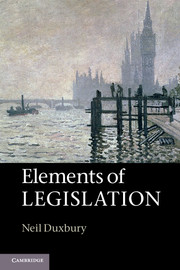3 - The quest to intellectualize statute law
Published online by Cambridge University Press: 05 December 2012
Summary
It can often seem that while legal philosophers have much to say about judicial decision making, statute law has stirred their imaginations comparably little. Yet two important themes in modern jurisprudence, legal interpretation and the relevance of intentions in law, invariably – which is not to say always explicitly – inform analyses of statute law. The first of these themes is central to Part III of this book, while the next chapter will address – and will take a position on – the question of whether intentions can be ascribed to legislatures. This chapter shows that it overstates matters to claim that jurisprudence has been inattentive to statute law. In modern legal philosophy, the authority of statutes has been subjected to considerable analysis, and the democratic superiority of enacted over judge-made law robustly defended. Generally speaking, none the less, the common-law jurist’s preoccupation with statute law has been sporadic at best. What explains this?
Block-heads’ law
The beginnings of an answer can be found, oddly enough, in an assessment of statute law offered by one of the most renowned critics of judge-made law, Jeremy Bentham. Bentham’s assessment was hardly romantic. Eighteenth-century English statute drafters, he asserted, ‘understand’ – and are ‘better paid’ when they practise – ‘the art of poisoning language’, and so they tend to produce statutes which are blighted by ‘repetitions and words’ which ‘are of no use’, and which are beyond the ken of ordinary citizens. It need not be this way, he insisted. Statutes could be written ‘with no more words than necessary … not only more intelligibly, but surer, in short sentences’. They could be ‘put into one great book, (it need not be a very great one) and what is particular to this and that class of persons … into so many little books, so that every man should have what belongs to him apart, without being loaded with what does not belong to him’. Bentham saw, in the discipline of statute drafting, an opportunity for the advancement of ‘the art of legislation’ – legislation, that is, conforming to the principle of utility. Although the legislative initiatives of nineteenth-century English law reformers may have borne Bentham’s influence, however, they were, by his own standards (and estimation), piecemeal and insufficiently ambitious. His vision of a properly codified, utilitarian system of law was never – it never could be – realized.
- Type
- Chapter
- Information
- Elements of Legislation , pp. 57 - 91Publisher: Cambridge University PressPrint publication year: 2012
References
- 1
- Cited by



